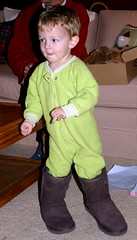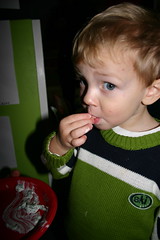Pennsylvania Academic Freedom
Earlier this month Armstrong took his road show to Temple University in Philadelphia. The turnout was much like it was at Pitt: sparse, with well-prepared administrators and AAUP representatives. Temple's outgoing president David Adamany reported that there had been no complaints of harassment, intimidation, retributive grading, or bias that had come through his office. The Temple NEWS added that "The only student scheduled to testify before the committee was Logan Fisher, a senior business major and vice-chairman of Temple's College Republicans. Fisher said professors have made him and friends of his feel awkward when voicing dissenting opinions during class. He read nearly a half-dozen anecdotes from anonymous students he said feared retribution for testifying, with most stories detailing professors degrading the Bush Administration, conservatives, or the Iraq war."
On the second day of testimony, Horowitz himself took the stand. Calling himself a "scary guy," Horowitz used no specifics in alleging pervasive liberal bias and a "climate" of political correctness, and talked 40 minutes beyond his deadline. (Desperate for publicity, Horowitz is a kind of Ann Coulter without the blond hair and friends on cable news shows.) In response, the Temple NEWS reported, "William E. Scheuerman, president of United University Professions at the State University of New York, and William Cutler III, president of the Temple Association of University Professionals, said unsubstantiated claims have been used to "hurl allegations" against professors who "live and die" by professional standards. "Horowitz's picture of higher education is as incorrect as it is insulting," Scheuerman said."
This committee has to finish its work by Nov. 30 and report back to the House. There are two more hearings planned before then.
What comes out from a close look at this farce, and what comes out when we compare Pennsylvania's experience to that of other states (Colorado, Florida) where Horowitz-inspired or -authored legislation (the so-called "Academic Bill of Rights") shows up is that it is autochthonous--it grows out of itself, nothing brought it into being. Armstrong has barely been able to produce ten complaints of bias or intimidation. It is, in the strictest possible sense, McCarthyism: loudly and self-righteously denouncing a threat whose actual existence is dubious. Even one of the committee members--Dan Surra, from Elk County--called the committee "a colossal waste of time" and "a resolution in search of a problem," and Rep Dan Frankel of Pittsburgh (my rep!) said that "for us to pretend there is widespread abuse going on is problematic."
And then, as any prof could tell you, the whole issue is foolish. Would that I could be so influential as to sway my students' political opinions! I can't even get them to do their reading when they know they have a quiz! If either Horowitz or Armstrong has actually met a prof that can produce that kind of lockstep obedience and ideological uniformity from his or her students, I'd like to bring that person here to teach me how to do it--I'd really like to figure out how to brainwash my freshmen to learn the difference between "its" and "it's". And as for grading students on what they believe, I challenge anyone to look at my grades or the grades of our first-year writing program and compare them to the political beliefs of the students--we have about a 3.0 average for the FYW classes (yeah, it's too high, I know) and I'd estimate that at least 50-60% of our students would self-identify as conservative, and less than 25% would self-identify as liberal.
In his often wordy but generally thoughtful blog, Penn State prof Michael Bérubé has posted a 5000-word response to this academic-freedom issue in Pennsylvania.



